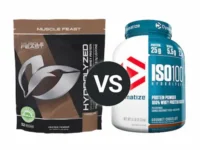Knowledge BaseYou're Questions Answered
BACK
Is whey protein bad for gout?
Whey protein is generally not considered harmful for individuals with gout, but it should be consumed with care, especially for those prone to flare-ups. Gout is a form of arthritis characterized by painful inflammation in the joints due to elevated uric acid levels, which form crystals in the joints. The condition is often triggered by consuming foods high in purines, which are metabolized into uric acid in the body. Fortunately, whey protein has relatively low purine content compared to other protein sources like red meat, organ meats, and certain seafoods, making it a potentially safer option for individuals managing gout1.
Can Whey Protein Benefit or Harm Gout?
- Low Purine Content: Whey protein contains much lower levels of purines than high-risk foods for gout sufferers, such as red meat and shellfish. As a result, consuming whey protein in moderation is less likely to elevate uric acid levels significantly, reducing the likelihood of triggering gout flare-ups2.
- Possible Anti-Inflammatory Benefits: Whey protein may offer anti-inflammatory properties, which could be beneficial in managing the joint pain and inflammation associated with gout. A few studies suggest that consuming dairy products, which includes whey protein, might help lower uric acid levels and reduce gout symptoms3. However, this effect may vary from person to person, and more research is needed.
- Risks of Excess Protein Consumption: While whey protein is low in purines, overconsumption of any protein source, including whey, can put additional strain on the kidneys. For individuals with compromised kidney function or those who are already dealing with kidney stones, excess protein intake could exacerbate their condition. Gout sufferers should be mindful of their total protein intake and avoid exceeding recommended amounts4.
Tips for Using Whey Protein with Gout
- Moderation is Key: For individuals with gout, it is crucial to consume whey protein in moderation. Starting with small amounts, such as one scoop a day, can help monitor the body’s response without overwhelming the kidneys or increasing uric acid levels. Always monitor symptoms and uric acid levels regularly5.
- Balance Protein with a Healthy Diet: While whey protein can be part of a balanced diet, gout sufferers should also focus on incorporating low-purine, plant-based proteins (such as legumes and tofu) and increasing their intake of vegetables, fruits, and whole grains. Avoiding high-purine foods like alcohol, organ meats, and certain seafood is also essential for managing gout6.
- Consult Your Doctor: It is always best to consult a healthcare provider before introducing or increasing protein supplements, including whey protein, especially for individuals with a history of gout or kidney-related conditions. A medical professional can help tailor dietary plans based on individual health needs and conditions7.
Was this answer helpful? Let us know!
Like
References:
- Choi, H. K., Atkinson, K., Karlson, E. W., Willett, W., & Curhan, G. (2004). Purine-rich foods, dairy and protein intake, and the risk of gout in men. New England Journal of Medicine, 350(11), 1093-1103.
- Bhole, V., Choi, J. W., Kim, S. W., de Vera, M., & Choi, H. (2010). Serum uric acid levels and the risk of type 2 diabetes: a prospective study. The American Journal of Medicine, 123(10), 957-961.
- Stamp, L. K., & Dalbeth, N. (2019). Uric acid lowering therapy for gout. Systematic Reviews, 8, 252.
- Dalbeth, N., & Merriman, T. R. (2019). Dairy foods and gout: An update. Current Opinion in Rheumatology, 31(1), 64-70.
- Zhang, Y., Chen, C., Choi, H., Chaisson, C., Hunter, D., Niu, J., & Neogi, T. (2012). Purine-rich foods intake and recurrent gout attacks. Annals of the Rheumatic Diseases, 71(9), 1448-1453.
- Mayo Clinic. (2019). Gout diet: What's allowed, what's not. https://www.mayoclinic.org/diseases-conditions/gout/in-depth/gout-diet/art-20048524
- Singh, J. A., & Reddy, S. G. (2011). The risk of cardiovascular disease and all-cause mortality in gout: A systematic review and meta-analysis. Arthritis Care & Research, 63(2), 187-193.
Add to this Answer
Related Questions

Disclosure
Your Answer
Do you have a suggestion to improve the answer? Please detail your suggestions and provide any references to information that may support your answer if available.
The content on this site has not been written, reviewed or endorsed by a medical professional. We assume no liability for the misuse of supplements and recommend you review the label of any product, as well as consulting with your health care professional.
We are a participant in the Amazon Services LLC Associates Program, an affiliate advertising program designed to provide a means for us to earn fees by linking to Amazon.com and affiliated sites.
We are a participant in the Amazon Services LLC Associates Program, an affiliate advertising program designed to provide a means for us to earn fees by linking to Amazon.com and affiliated sites.
© 2026 ProteinPowder.com






